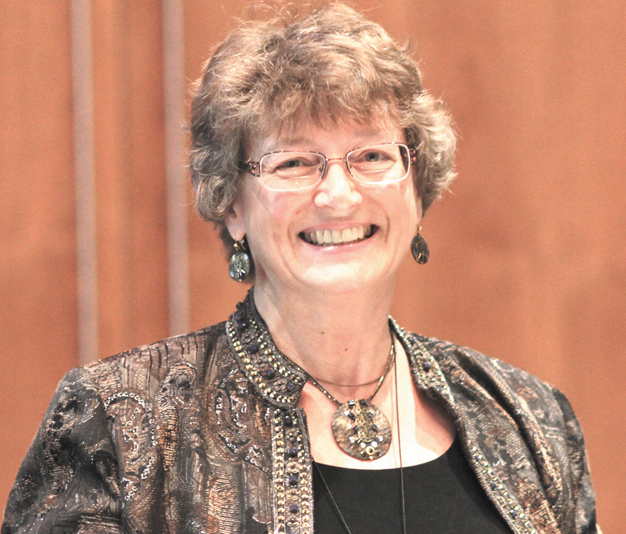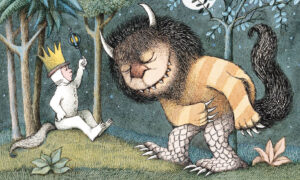Good or evil?

Judaism’s Worldview Series
Jewish Family Education with Candace R. Kwiatek, The Dayton Jewish Observer
“They roared their terrible roars and gnashed their terrible teeth and rolled their terrible eyes and showed their terrible claws,” goes the fearsome chant-like refrain in the picture book classic Where the Wild Things Are by Maurice Sendak. Sent to his room without supper for being a “wild animal,” the wolf-costumed, mischief-making Max sails into an imaginary world of wild beasts.
There, as the most wild thing of all, he is crowned king and launches an unrestrained rumpus. But when chaos ensues, Max commands, “Stop!” Despite the fearful beasts’ pleas and threats, he journeys home, where he finds his supper waiting.
Like the classic fairy tales and heroic quests, Wild Things is about overcoming monsters: how to master untamed qualities in oneself and how to conquer evil in the world.
Human perception of “monsters” is ubiquitous. According to anthropologist Donald Brown, forming moral sentiments of good and evil and distinguishing right and wrong are human universals, “inherent features of human nature regardless of upbringing or culture.”

This 20th-century discovery echoes the biblical view that God created humans in the Divine image: earthly reflections of the Creator’s attributes of a moral disposition, independent thought, and free will.
In other words, humans are divinely designed to recognize good and evil, comprehend their implications, and choose to act in either manner.
So what defines good and evil? Philosophy professor Peter Kreeft addresses the most common secular explanations: evolution, reason, conscience, human nature, and utilitarianism.
But guided by ever-changing context, desires, feelings, or groupthink, secular explanations only “reflect what is, rather than what ought to be,” Kreeft concludes.
In the Jewish worldview, God is the ultimate source of morality. As the Creator, God fashioned “a world that is fundamentally good,” Rabbi Jonathan Sacks notes, a word echoed repeatedly in the Creation story.
But when God formed light, a corresponding “not-light”—darkness — was created.
“All negative things are merely the absence of positive things,” Rabbi Jack Abromowitz explains. “Good is a real thing and evil is the lack of it.” But that means evil has the potential to become good.
That leads to God, the moral lawgiver, the source of rules, laws, and statutes designed to bring good into the world in partnership with humans.
The human, formed by the Creator with a yetzer hara, a selfish and undisciplined but productive evil inclination, and a yetzer hatov, an empathic and conscience-directed but focused good inclination, has the potential to bring both good and evil into the world.
Humans’ task is to use their dual inclinations, guided by God’s laws, to unleash sparks of goodness into the world to turn darkness into light.
It’s the perennial question: Why did God create a world with evil in it? Answer: “For there to be free will, there has to be choice. Evil has to be an option, and it must be attractive,” writes Rabbi David Aaron. The bigger question is, how can I partner with God to turn evil into good?
The firewood. Last winter was especially harsh, unbearably cold, recounts Reb Yerachmiel ben Yisrael. Some in the village called the cold evil. Foolish. It was winter and it was cold. Nothing more. But evil did come that winter in the decision to raise the price of firewood so high that many of us couldn’t afford to purchase enough to warm our homes.
The souvenir. After a fierce Yom Kippur War battle with Egyptians in the Sinai Desert, the surviving Israeli soldiers began looking for souvenirs. Ronen Mizrachi noticed a bulging breast pocket on one of the dead Egyptians. He pulled out a small book embossed with Arabic letters. A Koran. As the war dragged on, every so often he would flip through the Koran’s well-worn pages, here an underline, there a handwritten note.
One day, his convoy came across a lone Egyptian who surrendered without incident. When the captive was seated nearby, Ronen opened his canteen and offered the Egyptian a drink, then another. The man drank, gratefully blessing Ronen and his family, his eyes on the floor.
Noticing a suspicious bulge in the Egyptian’s breast pocket, Ronen motioned, “Take it out.” Slowly the Arab pulled out a small book embossed with Hebrew letters. A siddur (Jewish prayer book).
Ronen stared in disbelief, then slowly removed the Koran from his own breast pocket. The two men stared at each other. Ronen looked at the siddur and understood how the prayer book had fallen into Arab hands—just as the Koran had fallen into his. And he knew what to do.
He gave the Arab the Koran, and the Arab gave him the siddur. Ronen opened his and read, “I give thanks…You have returned my soul to me with compassion.”
Today, his siddur is well-worn, filled with underlines and handwritten notes.
The context. The presidents of Harvard, MIT, and UPenn recently testified during a House Committee hearing on campus antisemitism and calls for Jewish genocide in Israel.
When questioned whether calling for the genocide of Jews violates their schools’ code of conduct against bullying and harassment, none of the school leaders would categorically do so, explaining it would depend on context and conduct.
The honeymoon. Sitting together in an otherwise empty subway car, Daniel and Rivky Steiner shared memories of their wedding and the week of festive meals their friends had hosted afterward.
“I’m so grateful to everyone,” Rivky said, “but I wish we could go away alone somewhere just for a few days.”
Daniel added,“Like a honeymoon.” They smiled at each other.
At the next station a disheveled middle-aged man reeking of alcohol entered the car and sat down next to them.
When he asked, “Are you guys married or just friends?” they started chatting until the man rose to get off. On the platform, he turned to face them, flipped his wrist, and sent an envelope flying to land at their feet. Inside was $1,000 in cash.
“This world was not created for what is already good in it,” Rabbi David Aaron writes. “This world was created to be a forum for a new and higher kind of goodness — the goodness born out of overcoming evil and choosing to do good.”
Literature to share
Do Not Eat This Book! Fun with Jewish Foods & Festivals by Beth Kander. Newly on the market, this delightful picture book uses clever four-line verses to introduce Jewish holidays and their traditional foods. Sprinkled throughout are winsome cartoon characters, a little Yiddish, and a lot of humor, with more in-depth holiday descriptions and recipes at the end. This is a book for reading, creating, and tasting. Just don’t eat it!
Meeting Elijah: True Tales of Eliyahu HaNavi by Eliezer Shore. Meeting Elijah is a collection of 57 extraordinary real-life encounters with Elijah by ordinary individuals in the midst of a crisis. Heard directly from those involved or from their family or friends, these tales feature some kind of unexpected assistance just when needed, often from a stranger who then just disappears. They also include accounts of mysterious inspiration that bring others to be in just the right place at the right time to help. You’ll want to read them all more than once and share them with others.
To read the complete January 2024 Dayton Jewish Observer, click here.


